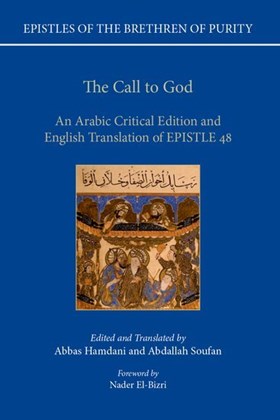The Call to God An Arabic Critical Edition and English Translation of Epistle 48
Oxford University Press in association with the Institute of Ismaili Studies
The Ikhwān al-Ṣafāʾ (Brethren of Purity), the anonymous adepts of a tenth-century esoteric fraternity based in Basra and Baghdad, hold an eminent position in the history of science and philosophy in Islam due to the wide reception and assimilation of their monumental encyclopaedia, the Rasāʾil Ikhwān al-Ṣafāʾ (Epistles of the Brethren of Purity). This compendium contains fifty-two epistles offering synoptic accounts of the classical sciences and philosophies of the age; divided into four classificatory parts, it treats themes in mathematics, logic, natural philosophy, psychology, metaphysics, and theology, in addition to didactic fables.
Epistle 48 deals with methods of advocating for the cause of the fraternity, and in calling different segments of society to join its ranks. Special templates for preachers engaging with the particular categories are provided throughout. It also addresses issues of governance and the ideal city, while emphasizing again the primacy of the soul over the body, and the need for followers to know themselves. The Epistle ends with a story based on the famous Bilawhar wa-Būdhasaf, given as an illustration of a successful mission. Epistle 48 reveals, more than any other epistle, the political nature of the fraternity and its mission, being, as the editors argue, part of the Fatimid missionary efforts in the period preceding the establishment of the Fatimid Dynasty.
Foreword, Nader El Bizri
Introductions and Translation
Author's Note, Abbas Hamdani
Introduction to Epistle 48, Abbas Hamdani
Technical Introduction, Abbas Hamdani
Technical Introduction to Epistle 48 (English Translation), Abdallah Soufan
Translation of Epistle 48, Abbas Hamdani
Appendix
Bibliography
Subject Locorum
Index Locorum
Arabic Part
Risāla 48, Abbas Hamdani and Abdallah Soufan
Arabic Index
Arabic Bibliography
Arabic Index
Abbas Hamdani is Professor Emeritus at the University of Wisconsin-Milwaukee. He received his BA in 1945 and LLB in 1947 from Bombay University, and his PhD from the School of Oriental and African Studies in 1950 in Arabic and Islamic Studies. He taught at the University of Karachi from 1951–1962, at the American University in Cairo from 1962–1969, and at the University of Wisconsin-Milwaukee from 1970 until his retirement in 2001. He has published on Fatimid history, medieval Islamic and Ismaili thought, and on the Islamic background to the Voyages of Discovery. He was awarded fellowships from the Fulbright Commission and the American Research Center in Egypt.
Abdallah Soufan received his BS in Mathematics, and his BA and MA in Arabic Language and Literature from the American University of Beirut, where he worked for several years as an Instructor of Arabic and Islamic Thought. He has recently received his PhD from Georgetown University. His research investigates dichotomies in classical Islamic thought, including the dichotomies of sunna/bidʿa, veridicality/tropicality, reason/tradition, word/meaning, and exoteric/esoteric.

